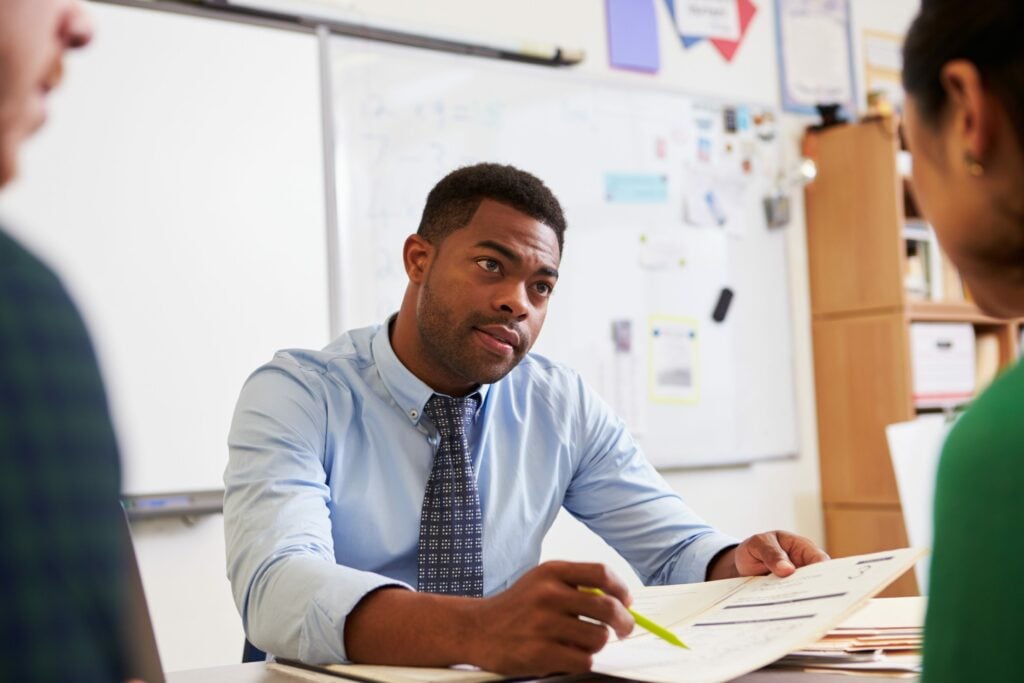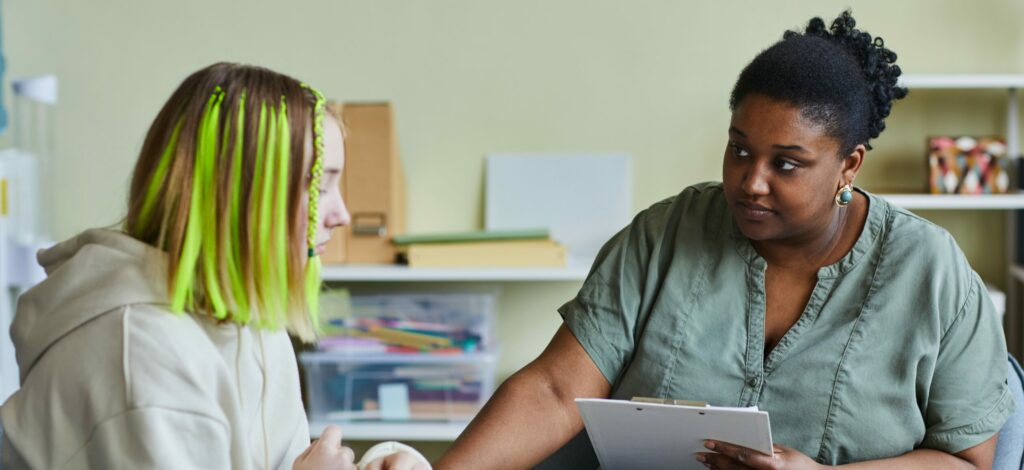Peer counseling helps students thrive
Reviewed by Stephanie Steinman, PhD, CSAC


In an ideal world, being a student is all about learning and growth. But school can also be a very stressful and challenging place.


Mental health issues have become much more common for students, especially since the start of the COVID-19 pandemic.1 Along with feeling pressure to do well academically, college students in particular now have to navigate remote learning, overwhelming student debt, and a complicated job market after they graduate.
The good news is that this generation of students is more open and willing to talk about their mental health concerns than any other.2 Although many have tried therapy (or at least considered it), a growing number are also showing interest in another form of support: peer counseling.
What is peer counseling?
As peer counselors, students offer support and guidance to others in their age range who need someone to talk with about how they’re doing. Because these counselors are at a similar stage of life, they can relate to the pressures and demands their peers are facing.
Any student can use and benefit from peer counseling, but it may be particularly helpful for students from systematically excluded communities. A survey of more than 2,000 students conducted by the Marie Christie Institute and the Born This Way Foundation found that peer counseling usage was especially high among Black, transgender, and first-generation students.3 Connecting with a peer counselor who has a similar identity can make the experience even more welcoming and affirming.
Peer counselors may also be more convenient and less intimidating for students who don’t feel ready for traditional therapy or can’t afford it. Although peer counselors don’t have formal training or credentials to diagnose mental health conditions, they can act as a catalyst for students to seek out professional help if they need it.
How popular is it?
The Marie Christie and Born This Way survey showed that one in five participants had already sought out peer counseling services.4 Of those who hadn’t yet looked for peer counseling, over 62% said they were interested in trying it, and nearly half of all respondents said pandemic challenges had made them likelier to seek support.
How peer counseling works
As peer counseling grows in popularity, many high schools and universities have started to offer training programs and certification courses. These school programs vary, but generally they have a common goal: to provide a safe environment where students can discuss their concerns honestly without being judged.
Depending on the school, students typically qualify for peer counselor training after taking part in a survey or an interview. Selected students are then invited to join one or more training sessions where they learn about basic counseling, communication, assertiveness, ethics, boundaries, privacy and confidentiality, and more. Their responsibilities may include:
- Listening to the concerns students bring to them
- Providing support for students who are going through a crisis or a tough time
- Taking part in group peer counseling sessions
- Tutoring students who are struggling academically
- Mentoring students in specific areas of need, such as self-esteem
- Referring students to other peer counselors or mental health professionals
- Guiding students through the process of finding mental health resources
- Increasing awareness of mental health issues through outreach initiatives
Peer counseling has traditionally been done in person, but today many schools are increasing access by taking their services online through platforms like Zoom.
Schools with peer counseling programs
This form of peer support is growing rapidly and expanding its reach. Here are several examples of high schools and universities that have successfully rolled out peer counseling to serve students.
Centennial High School
To join the peer counseling program at this Arizona-based school, applicants answer a series of questions, gather recommendations from two teachers and one peer, and get permission from a parent or guardian to participate.5 Following an interview, students chosen as peer counselors are expected to fill three key roles: as ambassadors for new students, mentors for students who need social support, and mediators for students experiencing conflict.
Oak Park High School
In this California-based school’s advanced peer counseling program, counselors meet for weekly training in areas such as conflict mediation, relationship building, and coping skills.6 They work with students one-on-one and in groups, including monthly in-class lessons for first-year physical education (PE) students. Each spring, peer counselors visit eighth-grade students at a nearby middle school to talk about transitioning to high school.
Severn School
This Maryland-based private day school offers a peer counseling program to upper-school students (grades 9 through 12).7 Peer counselors are sophomores, juniors, and seniors who’ve developed their listening, communication, and problem-solving skills through mandatory training sessions. In addition to helping their peers deal with common issues, counselors at Severn School also host events to help students get to know each other better.
Boston College
At Boston College, the Lean on Me network offers a texting hotline where students who need noncrisis emotional support are matched with peer supporters.8 Text conversations can last as long as a student likes, and the student can switch supporters if they want to connect with somebody else. The experience is kept as anonymous as possible, though phone numbers and conversation histories are retained in case a peer supporter needs to transfer a student to a mental health professional.
University of Central Florida
In fall 2021, the University of Central Florida announced a new online system called Togetherall that offers peer-to-peer support through its Counseling and Psychological Services (CAPS) agency.9 The system provides students with safe, anonymous online message boards where they can connect, share what’s on their minds, and support each other. Licensed mental health professionals help facilitate and monitor the program, encouraging participation and providing students with additional resources as needed.
University of Michigan
The University of Michigan’s Counseling and Psychological Services (CAPS) department oversees its peer counseling program to help support students who are struggling with common issues like loneliness, stress, adjusting to university life, making new friends, and learning about campus resources.10 Peer counselors are matched with students based on age and lifestyle factors so they can provide the most relevant guidance and support during in-person meetings.
Many other universities, colleges, and high schools already offer similar services, and more are getting on board all the time. If you’re a student, try searching for the name of your school plus a term like “peer counseling,” “peer mentoring,” or “peer support.”
How you can advocate for peer counseling
Staff and students who are interested in bringing this type of program to their school may be able to gain traction by starting a peer counseling committee. These groups work to raise awareness about peer counseling services and explore ideas for potential programs.
The committee’s goals could include:
- Identifying specific peer counseling services that would help students
- Running peer service initiatives on campus or at school
- Organizing peer counseling awareness events on campus or at school
- Exploring possible funding models for peer counseling initiatives
- Building relationships with relevant departments (such as health or psychology) at the institution
- Gaining the support of key stakeholders on campus
- Offering peer counseling training to interested students and staff
- Learning how students and peer counselors are benefiting from the program, identifying what needs improvement, and exploring how services could be expanded in the future
Today is a great day to take the first step toward helping students take care of themselves. Support from peers may be just what they need to begin their journey to better mental health.

Sources
1 https://pubmed.ncbi.nlm.nih.gov/34955924/
2 https://www.apa.org/monitor/2019/01/gen-z
3 https://bornthisway.foundation/research/peer-counseling-in-college
4 https://bornthisway.foundation/research/peer-counseling-in-college
5 https://www.peoriaunified.org/Page/3282
6 https://www.oakparkusd.org/cms/lib/CA01000794/Centricity/Domain/184/APC .pdf
7 https://www.severnschool.com/academics/student-support/peer-counselors
About the author
Elise Burley is a member of the therapist.com editorial team. She has more than a decade of professional experience writing and editing on a variety of health topics, including for several health-related e-commerce businesses, media publications, and licensed professionals. When she’s not working, she’s usually practicing yoga or off the grid somewhere on her latest canoe camping adventure.
Related articles

How are teachers managing their mental health?
Teachers are on the front lines of supporting kids. A psychologist and educator...

Taking our anxiety back to school
Heading back to school feels much heavier than it used to. Follow this...

Self-compassion in our most difficult moments
Self-care is an integral part of our well-being, but is it enough? Lisa Baylis...

Caring for yourself when your job is caring for others
Mental health professionals help people in crisis and provide emotional support...
